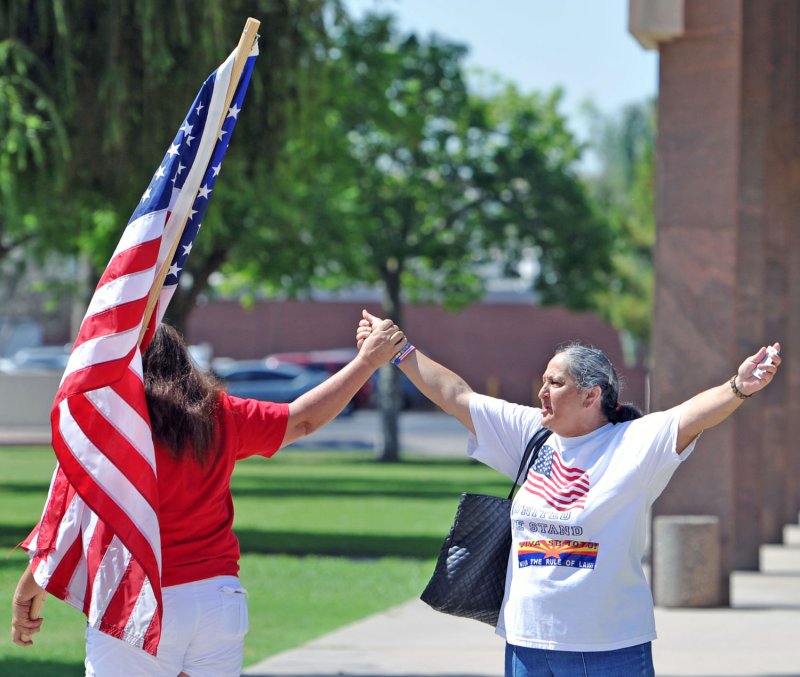1 of 6 | Two women give each other high fives as they claim victory with the US Supreme Court's decision on Arizona's controversial SB1070 immigration law in front of the Arizona State Capital in Phoenix, Arizona, June 25, 2012. UPI/Art Foxall |
License Photo
WASHINGTON, June 26 (UPI) -- Law enforcement officials say they expect a litigious period in the wake of the U.S. Supreme Court's split ruling on Arizona's immigration law.
"We absolutely expect lawsuits on both sides of this issue," Tucson Police Chief Roberto Villasenor told the Los Angeles Times. "This will result in our officers being tied up in court rather than working on the streets to reduce crime."
John Bennett, president of the Arizona Association of Chiefs of Police, said he expected "bumps in the road" as the new law is implemented.
"On the street, who knows what's going to happen?" he said. "We're going to enforce this law. There may be problems, but no matter what you do as a police department, you're always subject to litigation."
Under the split Supreme Court ruling Monday, police may not arrest people they suspect of a deportable offense without a warrant.
"As a general rule, it is not a crime for a removable alien to remain in the United States," Justice Anthony Kennedy wrote for the majority in a 5-3 ruling that said Arizona may not make immigration laws that supersede existing federal statutes.
Because it is not generally a crime, state law-enforcement officers do not have a right to jail or otherwise punish undocumented immigrants the federal government does not want to see penalized, wrote swing-vote Justice Kennedy, joined by conservative Chief Justice John Roberts and liberals Stephen Breyer, Sonia Sotomayor and Ruth Ginsburg.
"Arizona may have understandable frustrations with the problems caused by illegal immigration ... but the state may not pursue policies that undermine federal law," the court ruled.
"This is not the system Congress created. Federal law specifies limited circumstances in which state officers may perform an immigration officer's functions."
Under the ruling, state officials may not jail an undocumented immigrant under state law solely for failing to carry papers.
But the court said state officials may begin enforcing a part of Arizona Senate Bill 1070 that calls on police, when making lawful stops, to check the immigration status of people they reasonably suspect may be in the country illegally.
These status checks should not "result in prolonged detention," the court said.
Republican Arizona Gov. Jan Brewer -- who signed the law April 23, 2010, after arguing the state had to act because the federal government failed to -- claimed the decision to uphold a police right to check immigration status of arrested persons as a victory for law proponents.
"After more than two years of legal challenges, the heart of SB 1070 can now be implemented in accordance with the U.S. Constitution," she said. "I am confident our officers are prepared to carry out this law responsibly and lawfully. Nothing less is acceptable."
Unless the person who was stopped committed another crime, the most police can do, if the person is undocumented, is refer the case to federal authorities for possible deportation proceedings, the court said.
"We will not be issuing detainers on people unless they meet our priorities," an administration official told The Wall Street Journal.
Washington will continue to put priority on deporting those who commit crimes, have repeatedly violated immigration laws or have crossed the border recently, U.S. Homeland Security Secretary Janet Napolitano said Monday.
President Barack Obama issued a statement putting Arizona police officers on notice shortly after the decision.
"Going forward, we must ensure that Arizona law enforcement officials do not enforce this law in a manner that undermines the civil rights of Americans," the statement said
Brewer ordered revised training materials issued to officers Monday, which take the ruling into account. The new guidelines makes it plain that someone's appearance is not a factor in determining reasonable suspicion.
"The country of birth may be one factor that, in combination with others, may lead to a determination of reasonable suspicion of unlawful presence," the manual adds.
The court also struck down a section of the Arizona law that made it a crime for undocumented immigrants to work or to try find work. Federal law punishes employers for hiring such immigrants but not the workers themselves, unless they use fraudulent documents or commit perjury to obtain work.
Justice Samuel Alito agreed with the majority that Arizona's alien-registration requirement was void, but voted to uphold SB 1070 provisions making it a crime for undocumented immigrants to seek work and authorizing arrests of certain aliens without warrants.
Justices Antonin Scalia and Clarence Thomas filed separate dissents arguing the Arizona law -- officially called the Support Our Law Enforcement and Safe Neighborhoods Act -- should be upheld in its entirety.
Justice Elena Kagan, who served as solicitor general during earlier stages of the litigation, recused herself from the case.
Obama, whose administration had wanted the whole Arizona immigration law declared unconstitutional -- said he was "pleased" with the court's decision, but voiced his concern about the provision the court upheld.
"I agree with the court that individuals cannot be detained solely to verify their immigration status. No American should ever live under a cloud of suspicion just because of what they look like," he said in a statement.
"What this decision makes unmistakably clear is that Congress must act on comprehensive immigration reform," he said. "A patchwork of state laws is not a solution to our broken immigration system -- it's part of the problem," his statement said.















